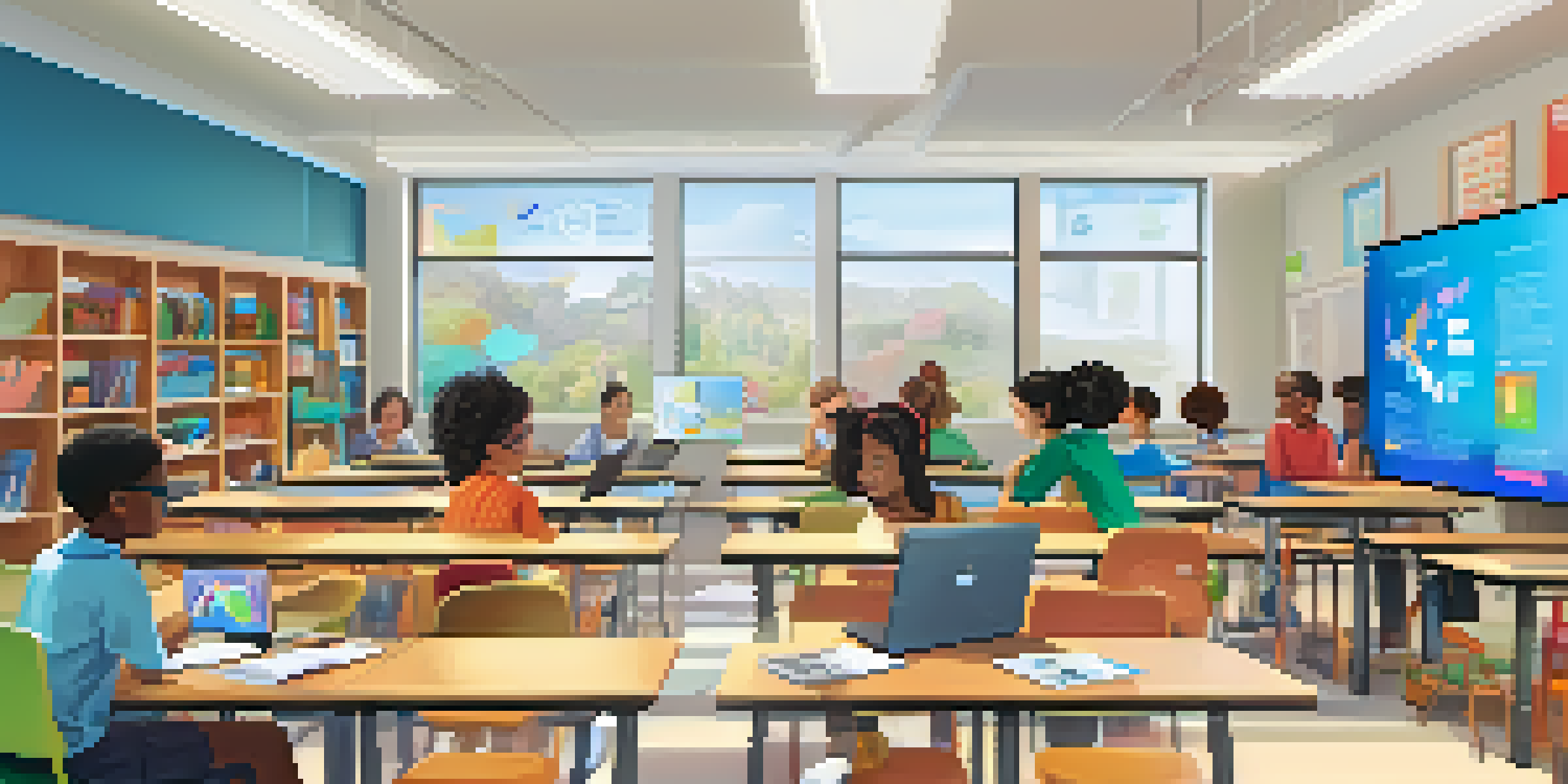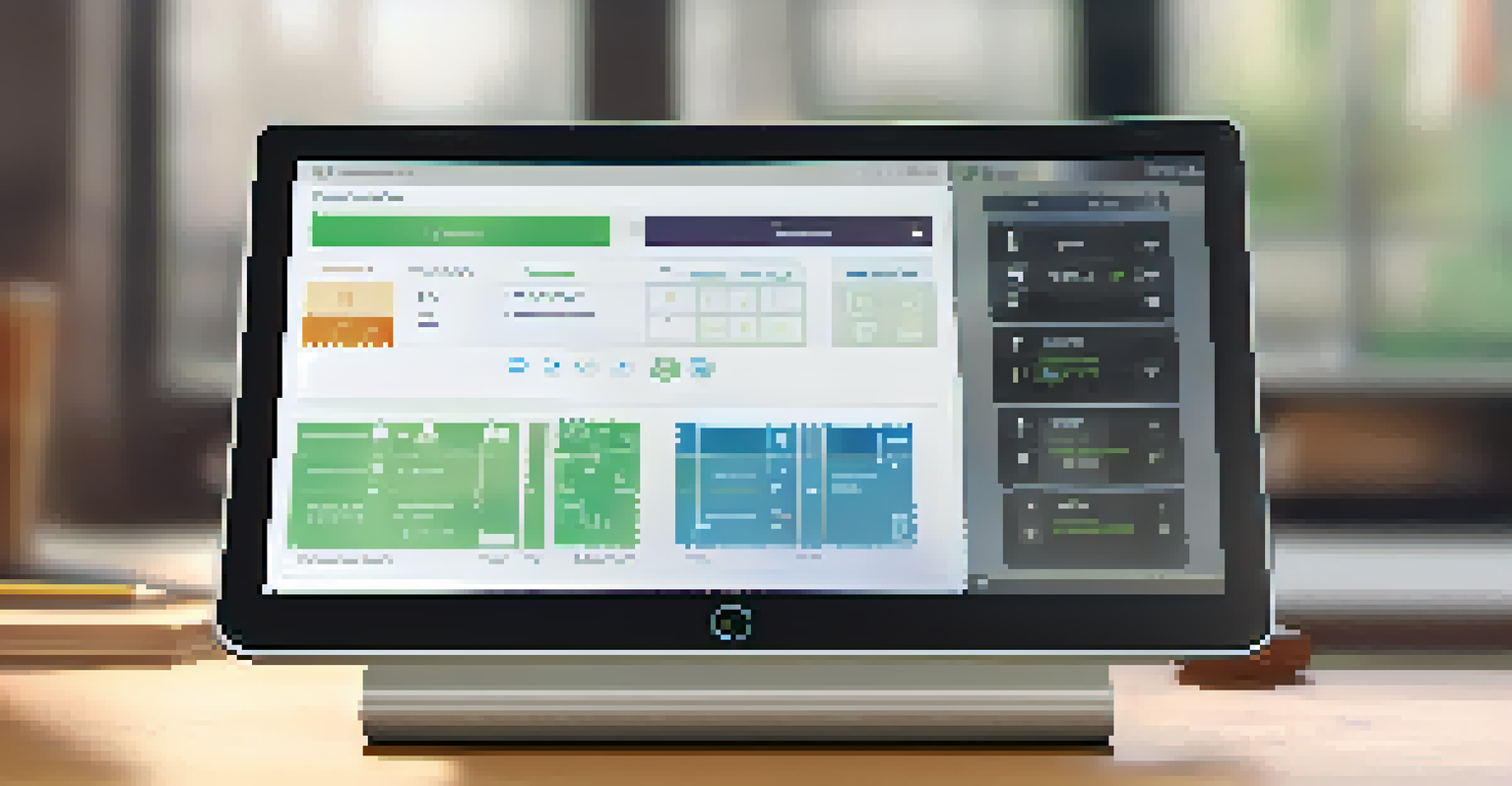How Adaptive Learning Facilitates Lifelong Learning Opportunities

Understanding Adaptive Learning and Its Importance
Adaptive learning is an educational method that tailors the learning experience to individual needs. By utilizing technology and data, it adjusts content in real-time, ensuring that each learner progresses at their own pace. This approach is essential in today’s fast-paced world, where traditional one-size-fits-all education often falls short.
Education is the most powerful weapon which you can use to change the world.
Imagine a classroom where each student is engaged at their own level, with lessons designed specifically for their strengths and weaknesses. This personalized experience not only boosts confidence but also enhances overall learning outcomes. Adaptive learning transforms education from a rigid structure into a dynamic journey.
Moreover, as the workforce evolves, the ability to learn and adapt becomes crucial. Adaptive learning supports this by providing the flexibility needed to acquire new skills throughout one’s career. This method empowers individuals, making lifelong learning not just a possibility, but a practical reality.
How Technology Powers Adaptive Learning
At the heart of adaptive learning lies advanced technology, including artificial intelligence and data analytics. These tools analyze a learner's performance and preferences, allowing for a customized educational experience. Think of it as having a personal tutor available 24/7, guiding you based on your unique learning style.

For instance, platforms like Khan Academy use algorithms to assess a student’s understanding and suggest resources accordingly. Such technology helps identify knowledge gaps and provides targeted exercises to fill them, ensuring that learners are always challenged but never overwhelmed. This responsive learning environment fosters a sense of accomplishment.
Adaptive Learning Personalizes Education
Adaptive learning tailors educational experiences to individual needs, enhancing engagement and learning outcomes.
In addition, the accessibility of online resources means that learners can engage with materials anytime, anywhere. This flexibility not only accommodates different schedules but also encourages continuous learning, breaking down barriers that traditionally hinder education. Technology, therefore, plays a pivotal role in making adaptive learning a staple in lifelong education.
Fostering Self-Directed Learning Through Adaptivity
One of the most significant benefits of adaptive learning is its ability to foster self-directed learners. By enabling individuals to take control of their education, it encourages them to seek out knowledge actively. This empowerment is crucial in developing a mindset geared toward lifelong learning.
The only way to learn mathematics is to do mathematics.
Consider how adaptive learning platforms often include features that allow learners to set personal goals and track their progress. This level of autonomy not only motivates individuals but also instills a sense of responsibility for their own learning journey. It’s akin to steering your own ship through uncharted waters.
As learners become more self-directed, they develop essential skills such as critical thinking and problem-solving. These skills are invaluable in both personal and professional spheres, equipping individuals to navigate challenges with confidence. In this way, adaptive learning nurtures a generation of proactive learners ready to embrace lifelong education.
Creating Inclusive Learning Environments with Adaptivity
Adaptive learning is inherently inclusive, catering to diverse learning styles and needs. This inclusivity ensures that everyone, regardless of background or ability, can access quality education. It's a vital element in promoting equity in learning opportunities, particularly in a globalized world.
For example, learners with disabilities benefit significantly from adaptive technologies that offer customized support. Features such as text-to-speech and adjustable content difficulty can make a world of difference, allowing these learners to engage meaningfully. Imagine how empowering it is for someone to learn at their own pace without feeling left behind.
Technology Enhances Learning Flexibility
Advanced technology, like AI and data analytics, drives adaptive learning, allowing for real-time customization and accessibility.
In fostering an inclusive environment, adaptive learning not only enhances individual experiences but also enriches group dynamics. When learners from varied backgrounds come together, they share unique perspectives, fostering collaboration and innovation. This collective learning experience is beneficial in both educational settings and future workplaces.
The Role of Feedback in Adaptive Learning
Feedback is a cornerstone of the adaptive learning process, providing vital information about a learner's progress. Unlike traditional methods, where feedback may come too late, adaptive learning systems deliver real-time insights, allowing learners to adjust their strategies immediately. This instant response is crucial for effective learning.
Think of feedback as a GPS for your educational journey; it helps you navigate your path and make necessary adjustments along the way. With regular updates on performance, learners can identify strengths to build upon and weaknesses to address. This ongoing dialogue ensures that education remains fluid and responsive.
Moreover, constructive feedback promotes a growth mindset, encouraging learners to view challenges as opportunities. By embracing this mentality, individuals are more likely to persist in their learning endeavors, ultimately leading to greater success in their lifelong learning journeys. In this way, feedback transforms the educational experience.
Examples of Adaptive Learning in Action
Several innovative companies and institutions are already harnessing the power of adaptive learning. For instance, Coursera and EdX offer courses that adjust to learner performance, providing personalized recommendations based on progress. These platforms exemplify how adaptive learning can effectively cater to a global audience.
In K-12 education, programs like DreamBox Learning adapt math lessons to each student’s understanding, ensuring that learners master concepts before moving on. Such approaches highlight the potential of adaptive learning to address educational disparities, making learning more effective for all students.
Fosters Lifelong Self-Directed Learning
By empowering learners to take control of their education, adaptive learning nurtures critical skills and promotes a growth mindset.
These examples illustrate that adaptive learning is not just a theoretical concept—it’s actively reshaping how we approach education. By showcasing success stories, we can inspire others to adopt adaptive methods, ultimately broadening the reach of lifelong learning opportunities.
The Future of Adaptive Learning and Lifelong Education
As we look to the future, adaptive learning is set to redefine the landscape of education. With advancements in technology, we can expect even more personalized and engaging learning experiences. The integration of artificial intelligence and machine learning will allow for deeper insights into learner behavior, paving the way for truly customized education.
Moreover, as the demand for lifelong learning continues to grow in an ever-changing job market, adaptive learning will become essential. It offers a flexible framework that allows individuals to upskill and reskill continuously, ensuring they remain competitive. This adaptability is crucial in a world where change is the only constant.

In conclusion, the future of education lies in embracing adaptive learning as a means to facilitate lifelong learning. By prioritizing personalized experiences, we can empower individuals to take charge of their education and thrive in both their personal and professional lives. The journey of learning never ends, and adaptive learning is here to guide us along the way.